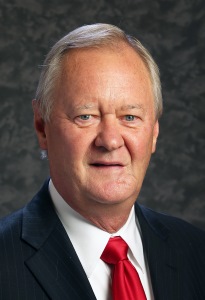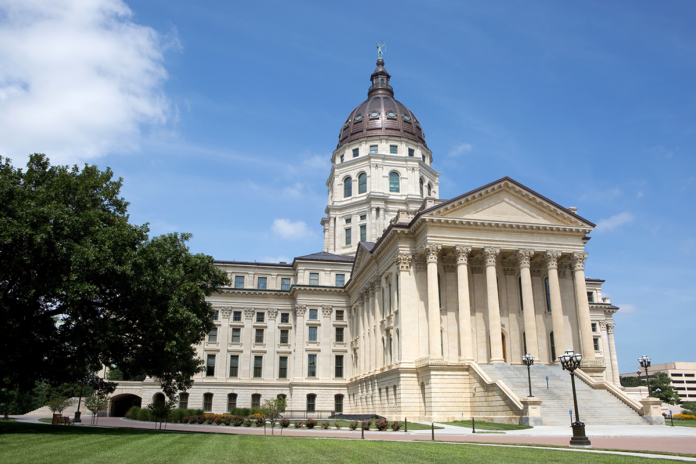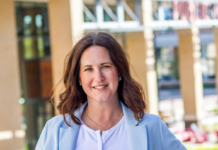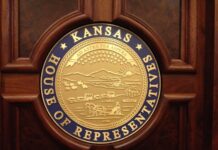They came to the Legislature in 2016 to fix government.
They wanted to reverse deep income tax cuts blamed for blowing holes in the budget.
They wanted to end the legal fight over funding schools.
They wanted to put more money into roads, social services and corrections.
They did what they said. And four years later, most of them are gone.
This week, state Sen. Dan Goddard became the latest moderate Republican from the class of 2016 to lose a primary in the last two election cycles.
Twenty-four moderate Republicans swept into the statehouse in 2016 as the Legislature grappled with a budget bleeding revenue as a result of deep tax cuts.
Just eight of those moderates who were elected as Republicans in 2016 — one in the Senate and seven in the House — remained this week.
All two dozen of them voted to reverse former Gov. Sam Brownback’s tax cuts. They also supported expansion of Medicaid.

“We had to take some medicine that maybe didn’t taste so good in 2017,” said state Rep. Jan Kessinger, who lost his primary this year after winning the seat in 2016.
But those very votes have come back to haunt many of those candidates who ran for reelection in 2018 and 2020.
“No good deed goes unpunished,” said Republican state Rep. Russ Jennings, a veteran moderate in the House.
“Those folks came in with an articulated purpose of righting the ship and regaining solvency for the state, and that meant some things that were difficult and hard to do,” Jennings said.
“There were things they were involved in that were weaponized in primaries and served to leverage them out.”
Others believe the moderates misread the political climate within the Republican Party to justify votes to expand Medicaid, put limits on firearms or against the faith-based adoption bill that critics said was discriminatory.
“The class of 2016 clearly misinterpreted the message of that election,” said Republican strategist Jared Suhn, who works for conservative candidates.
“Nationally in 2016, we saw substantial anti-establishment and anti-incumbent trends,” Suhn said. “Those were fueled in Kansas partly by opposition to a small portion of Brownback’s tax cuts.
“Moderate Republicans took that as a full-throttle embrace of more liberal policies across the board by the GOP electorate and ultimately way overreached.”
After the 2020 round of primaries, state Sen. John Doll was the only moderate Republican from 2016 left standing in the Senate.
Sen. Dinah Sykes was elected as a moderate Republican in 2016 but became a Democrat because she thought the GOP had increasingly veered to the right.
She faces a challenge from Republican Tom Bickimer this fall.
Over in the House, state Rep. Brenda Dietrich was part of the class of 2016, but she is now running for the state Senate.
She was one of the few moderate success stories on Election Day, defeating conservative incumbent Eric Rucker in the primary.
It remains to be seen just how much control conservatives will have in the House and Senate, with so many races still up in the air in the general election.
Conservatives went into the primaries with roughly 56 members in the House and 19 members in the Senate.
But those numbers are still fluid, given that conservatives will be running into some well-financed Democrats in suburban areas that are leaning more blue.
“The whole story is going to be told in the general election,” Jennings said. “It’s one thing to win a Republican primary in this environment, it will be something else to win a general election.”

What is known is that moderates will have less influence in the Republican caucus, which could decide the fate of Gov. Laura Kelly’s agenda for the rest of her first term.
Looking back, many of the moderates who failed to get past a first or second term have no regrets about their votes. They would do it again.
They say the state had problems. They felt called upon to address them.
“Being reelected wasn’t as important as fixing the fiscal condition of the state of Kansas. That was my priority,” said Republican Sen. Ed Berger, who lost his primary when he ran up against ads saying he was for higher taxes and voted with the “liberals.”

“The state was in fiscal crisis,” Berger said. “Everything from mental institutions to higher education to K-12 education were absolutely being severely underfunded because we didn’t have revenues.”
Some blame their losses partly on conservative groups that dumped thousands of dollars into their districts with ads that they say skewed their voting record without acknowledging the role those very groups played in the state’s fiscal crisis.
“There were mailers sent out that (said) I voted for a $1.2 billion tax increase, but then so did the speaker of the House and that really didn’t tell the story,” Kessinger said.
“Things get twisted for political reasons; what’s good on a good postcard.”
Republican state Sen. Randall Hardy said he thought his record was misrepresented in his unsuccessful primary campaign state Rep. J.R. Claeys.
Hardy said ads run by the Kansas Chamber of Commerce used his votes on taxes to portray him as a tax-and-spend Republican.
He said he took conservative positions, pointing to his support for the constitutional amendment on abortion that couldn’t pass the Legislature earlier this year.

“You’d like to think that people don’t pay attention to negative marketing, but that was probably what did me in,” Hardy said.
Hardy said he wouldn’t change his votes today.
“All of my votes were carefully thought out,” Hardy said.
“They were done in consultation with groups back in the district. I felt like I was representing the needs and the desires of the district.”
Hardy, who beat conservative Tom Arpke in 2016, said he didn’t think he was out of step with what the voters wanted.
“I thought I was performing on the basis of what I ran on,” he said.
“Historically, this district has been somewhat more moderate, but in a primary that doesn’t tend to be the case.”
Alan Cobb, president and CEO of the Kansas chamber, made no apologies for the ads.
“There’s nothing to distort. Did you vote this way, or did you not?” Cobb said. “Exposing people’s voting records is part of campaigning.”

Republican consultant Stephanie Sharp said the stage was set for moderates in 2016 as Kansas’ budget troubles became more pronounced and the state was mired in its sixth year of litigation over school funding.
“In 2016, there was this big wave of, ‘Can we just talk about sanity?'” she said.
After a couple years, when the problems subsided, she said, voters forgot.
“Basic good governance is boring,” Sharp said. “That doesn’t get people out to vote.
“Once people aren’t worried about government any more, they’re not angry any more,” she said. “They’re not voting.”
Sharp simplified it further.
“Stability isn’t sexy,” she said. “When you see ‘tax increase’ in all capital letters in a big splashy, flashing ad on your desktop, that’s sexy.”
















